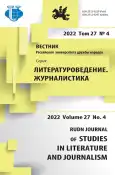Аудиовизуальные медиа в вузах России: типология и анализ контента
- Авторы: Уразова С.Л.1, Громова Е.Б.2, Кузьменкова К.Е.3, Митковская Ю.П.4
-
Учреждения:
- Всероссийский государственный университет кинематографии имени С.А. Герасимова
- Филиал МГУ имени М.В. Ломоносова в г. Севастополе
- Российский университет дружбы народов
- Национальный исследовательский университет «Высшая школа экономики»
- Выпуск: Том 27, № 4 (2022)
- Страницы: 808-822
- Раздел: Журналистика
- URL: https://journal-vniispk.ru/2312-9220/article/view/318929
- DOI: https://doi.org/10.22363/2312-9220-2022-27-4-808-822
- ID: 318929
Цитировать
Полный текст
Аннотация
Приводится авторская типология отечественных аудиовизуальных медиа, представленных как образовательные платформы для информирования, развития внутренних и внешних коммуникаций, формирования профессиональных компетенций среди будущих специалистов в сфере журналистики, связей с общественностью и рекламы. Авторы анализируют методику подготовки телерадиопрограмм в соответствии с образовательными стандартами. Повышенное внимание к функционированию студенческих СМИ, прежде всего аудиовизуальных медиа в связи с активно развивающейся тенденцией визуализации медиапространства, а также интерес к методикам профессиональных компетенций будущими журналистами, редакторами, PR-менеджерами и маркетологами в разных российских вузах, обусловлено прежде всего процессами интенсивного развития в XXI веке техногенной революции, использованием инновационных технологий и начавшимся апробированием на практике функционала как искусственного интеллекта (Artificial intelligence, AI), так виртуальной реальности (Virtual reality, VR). Внедрение высоких технологий требует быстрого обновления образовательных методик и стандартов при подготовке профессиональных кадров в сфере журналистики. С этим связана проводимая ныне в России реформа в сфере науки и образовании, нацеленная на активное вовлечение будущих молодых специалистов в развитие научно-исследовательских изысканий. На это нацелена и государственная программа «Приоритет 2030», способствующая развитию творческих инициатив среди молодежи. В этом контексте представленный анализ функционирования студенческих медиа в российских вузах приоткрывает завесу над тем, как формируются знания, компетенции и профессиональный опыт будущих специалистов, раскрывает возможности расширения национального информационного пространства.
Об авторах
Светлана Леонидовна Уразова
Всероссийский государственный университет кинематографии имени С.А. Герасимова
Email: svetlana.urazova@gmail.com
ORCID iD: 0000-0003-2264-2859
доктор филологических наук, доцент, главный редактор научного журнала «Вестник ВГИК»
Российская Федерация, 129226, Москва, ул. Вильгельма Пика, д. 3Екатерина Борисовна Громова
Филиал МГУ имени М.В. Ломоносова в г. Севастополе
Автор, ответственный за переписку.
Email: katya-64@inbox.ru
ORCID iD: 0000-0003-4705-4180
старший преподаватель, кафедра журналистики, историко-филологический факультета
Российская Федерация, 299001, Севастополь, ул. Героев Севастополя, д. 7Ксения Евгеньевна Кузьменкова
Российский университет дружбы народов
Email: kuzmenkova-ke@rudn.ru
ORCID iD: 0000-0002-8064-3828
тьютор по учебной работе, филологический факультет
Российская Федерация, 117198, Москва, ул. Миклухо-Маклая, д. 10, корп. 2Юлия Павловна Митковская
Национальный исследовательский университет «Высшая школа экономики»
Email: julia.mitkovskay@gmail.com
ORCID iD: 0000-0002-8439-0573
магистрант, направление подготовки «Менеджмент в СМИ», факультет коммуникаций, медиа и дизайна
Российская Федерация, 101000, Москва, Покровский б-р, д. 11Список литературы
- Bolkunov, A.N. (2009). Typology of student press in Russia at the beginning of the 21st century. Izvestiya of Saratov University. Sociology. Politology. Series: Sociology. Political Science, (4), 84–86. (In Russ.)
- Fateeva, I.A. (2015). New technological formats of the media education projects. Chelyabinsk State University Bulletin: Philology. Art History, 360(5), 40–46. (In Russ.)
- Fedorov, A.V., Novikova, A.A., Chelysheva, I.V., & Karuna, I.A. (2004). Media literacy of future teachers in the light of the modernization of the educational process in Russia. Taganrog: Kuchma Publ. (In Russ.)
- Goodman, R., & Steyn, Е. (Eds). (2017) Global journalism education in the 21st century: Challenges & innovations. Austin: Knight Center for Journalism in the Americas, University of Texas at Austin.
- Grabelnikov, A.A. (2017). On the everyday life of journalistic education. The Age of Information, (3), 35–38. (In Russ.)
- Gusenkova, А.Ye. (2010). Study newspaper of the faculty of journalism: Setting the problem of the mediaeducation project. Sign: The Problem Field of Media Education, 6(2), 9–11. (In Russ.)
- Kilpelainen, E.S. (2019). Transformation of professional competencies of a journalist during the digitalization of media space (PhD. Philol. sci. diss.). Moscow. (In Russ.)
- Kokhanova, L.A. (2017). Trends in modern journalism as a factor in the transformation of the profession. Vestnik of Volzhsky University after V.N. Tatischev, (2), 147–155. (In Russ.)
- Masterman, L. (1989). Teaching the media. London: Routledge.
- Nosova, Yu.A. (2007). Domestic press for student youth: Historical and typological aspect (PhD. Philol. sci. diss.). Rostov-on-Don. (In Russ.)
- Shesterkina, L.P. (2016). How to create a 360-degree multimedia newsroom at university: From the experience of SUSU Journalism Department. In E.L. Vartanova, L.P. Shesterkina (Eds.), Universities and Media: From Newspaper to 360-Degree Multimedia Newsroom: Proceedings of the Workshop of the Educational and Methodological Council on Journalism (28–29 October 2015). Chelyabinsk: SUSU Publ. (In Russ.) https://doi.org/10.17223/26188422/2/2
- Shesterkina, L.P., & Marfitsyna, A.R. (2017). Practical journalism in search of ways to improve journalism education. Russian Journal of Media Studies, (2), 24–38. (In Russ.)
- Shesterkina, L.P., Kharitonova, O.Yu., & Krasavina, A.V. (2022). Project-based learning in distance education format: Case study for training students majoring in journalism at the SUSU Institute of Media and Social Sciences and Humanities. In A.L. Shestakov (Ed.), Organization of the Educational Process of Universities using Blended and Distance Learning Technologies in a Pandemic: Regional Experience (pp. 514–532). Chelyabinsk: SUSU Publ. (In Russ.)
- Svitich, L.G. (2015). Changes in journalistic profession under conditions of media convection. Bulletin of Chelyabinsk State University. Series: Philology. Art History, 94(5), 406–413. (In Russ.)
- Urazova, S.L. (2011). Convergence as a factor of media viability in the digital environment. Theoretical aspect. Vestnik of Lobachevsky University of Nizhni Novgorod, 5(1), 287–293. (In Russ.)
- Urazova, S.L., Volkova, I.I., & Pisareva, M.N. (2020). Criteria for forming a communicative space in the student environment: Immersion in creativity. Scholarly Notes of Transbaikal State University, 15(1), 75–81. (In Russ.) https://doi.org/10.21209/2658-7114-2020-15-1-75-81
- Vartanova, E.L., & Lukina, M.M. (2017). Russian journalism education: Challenging media change and educational reform. Journalism & Mass Communication Educator, 72(3), 274–284. (In Russ.) https://doi.org/10.1177/1077695817719137
- Zhilavskaya, I.V. (2013). Media education of youth. Moscow: Sholokhov Moscow State University for Humanities.
Дополнительные файлы









